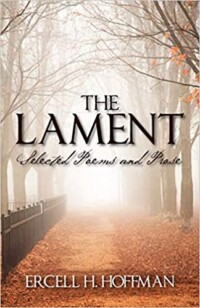Title: The Lament: Selected Poems and Prose
Author: Ercell H. Hoffman
Publisher: Outskirts Press
ISBN: 978-1432743468
Pages: 118
Genre: Poetry
Reviewed By: David Allen
Pacific Book Review
Students of serious poetry as well as poetasters of every stripe will find much to ponder, fascinate and delight in this collection by Ercell H. Hoffman. The pieces in this chapbook range from one verse-long stunners to more discursive more rambling prose poems.
Hoffman’s use of language, multi-tiered and multi-dimensional, is fierce and at times unique. Which perfectly suits the weave: hers is a tapestry of memory, sadness, occasional madness, and beaucoup desire, sensitivity and love. Consider the lines:
To live without love is to live without food and drink.
I’m dying of starvation and thirst!
To crave for the ideal is a yoke upon those who hunger after it.
Hoffman’s verse variously celebrates, bemoans but always apostrophizes the stewpot of tenderness, love and romance. The poet captures the many shades and fractals of these in this no-holds-barred disclosure of self. The Lament is a lyrically poised polygraph. The poet asks you her questions and tells you no lies. What is a poem?
A poem is born to the poet as the dream is to a sleeper.
It is welcomed by the soul as the early morn its dew.
Its nourishment is no less than is the pollen left on the bud by the life-giving bee.
Like a blossoming flower the soul is relieved.
There is history in here. There are elegies to racial and social divides, as lived personally. At the same time, inspiration and language from the medieval courtly tradition of troubadours and minnesingers is evident: in the grammar, in the use of archaic pronouns, in the exotic roll of the meter. Romantic love is not the only focus of Hoffman’s swift and evocative darts. Here’s her description of a child:
I saw his eyes, kissed his lips . . .played with his nose.
My child, you are the gift of months of longing
and the drink that quenches my thirst for love.
Poems like these achieve a lyrical intensity, a ludic presence, that is palpable, almost apocalyptic. D. H. Lawrence and Dylan Thomas would be suitable next reads! At the end of the day, Hoffman’s paramount concerns are existential. Life can be sticky business. But those who wish to play, to truly live, will agree with the poet that “… life…comes with defiance of death.”


